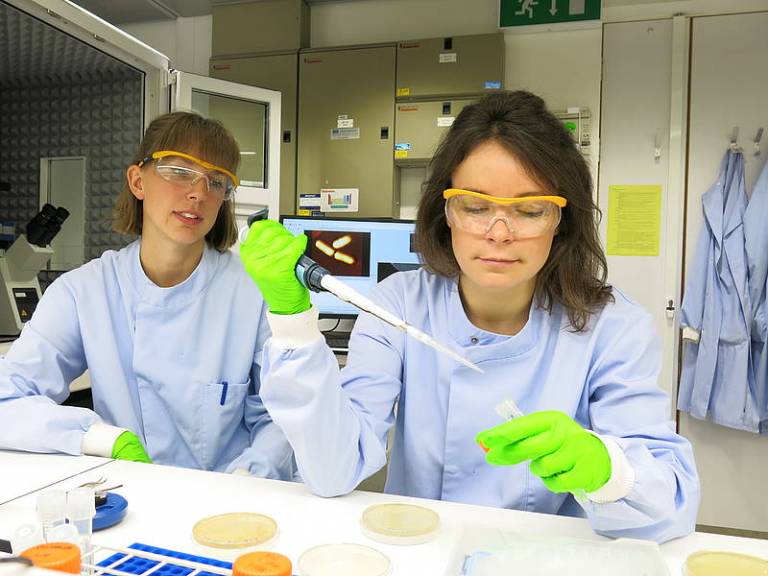EPSRC announce £3.8M in IRC Next Steps funding for i-sense
7 December 2017

The Engineering and Physical Sciences Research Council (EPSRC) have announced £3.8M in IRC Next Steps funding awarded to i-sense for their pioneering development of agile early warning sensing systems for infectious disease and antimicrobial resistance.
Led by Professor Rachel McKendry at UCL, i-sense is an interdisciplinary research collaboration (IRC) on the cusp of revolutionalising the way we track, test and treat infectious disease globally.
The funding is part of a larger £11M boost to EPSRC’s three IRCs to support the development of leading healthcare research into National Centres of Excellence. The i-sense IRC Next Steps award is the largest funding awarded to any IRC.
Professor of Biomedical Nanotechnology at UCL and i-sense Director, Professor Rachel McKendry says “Since i-sense received its original £11M in funding from EPSRC in October 2013, we have been working to harness the power of mobile phones, biomedical engineering, nanotechnology, genomics and big data to detect diseases much earlier than ever before, help people gain faster access to care and protect populations.”
Recent outbreaks of Ebola and Zika viruses have exposed the world’s vulnerability to emerging infectious diseases and further highlighted the urgent need for early warning systems.
“Follow on funding will maximise the impact of the current i-sense IRC, retaining key staff and delivering a step change in new capabilities to respond to emerging infections,” says Professor McKendry.
Expanding the scope for i-sense
The i-sense team have made significant achievements including the development of deep learning models of Google data for national influenza syndromic surveillance and mobile phone-connected tests to diagnose infections, including HIV and Ebola in low resource settings.
Professor of Biomedical Materials and Regenerative Medicine at Imperial College London and i-sense IRC Next Steps Deputy Director, Professor Molly Stevens, says “i-sense brings together a unique consortium with the right interdisciplinary skill sets to make a real difference in engineering innovation and human impact.
“We look forward to building on our nanoparticle-based work and testing it at the point-of-care for early disease diagnosis.”
Follow on funding will help i-sense achieve five interwoven objectives, including:
1. Continued development of online syndromic detection tools
2. Building of smartphone connected diagnostic tests
3. Ongoing design of state-of-the-art data visualisation tools
4. Investment in the careers of talented researchers
5. Forming key partnership with clinical and industry partners
To further assist in achieving their objectives and to transition into a National Centre for Excellence, i-sense has leveraged an additional £10M, including new laboratory infrastructure, academic positions and funding from Public Health England, the Africa Health Research institute, UCL Partners, academic partners and industry.
Professor McKendry says “i-sense is also regularly engaging with Public Health England, clinicians, industry, patients, policy makers and the public to understand end-user needs and ensure our tools and technologies are valuable.”
Building the digital future of public health
Building new technologies to track, test and treat infectious disease has the potential to bring major human and economic benefits to millions of people worldwide, by facilitating faster access for patients to receive potentially life-saving treatments.
Professor of Computer Science at UCL and Deputy Director of i-sense, Professor Ingemar Cox, says “Traditional health surveillance schemes are based on data collected from people that use healthcare services, however not everyone visits their doctor or hospitals.
“Future work for the i-sense group at the Department of Computer Science in UCL will continue developing ways to harness deep learning of millions of symptoms reported online every day to identify outbreaks, potentially before people visit their doctors and in resource-limited settings, and to evaluate the effectiveness of public health interventions and responses.”
i-sense will continue to engineer a new generation of diagnostic tools that are adaptable to different diseases, antimicrobial resistant strains, and different environments.
The new paper-based, mobile phone-connected diagnostics will help widen access to testing in the home, including self-tests, and devices to support front-line health workers in care homes, and remote locations in Africa.
Management of outbreaks will also benefit from the further development of state-of-the-art visualisation tools that map ‘hot spots’ and target opportunities for interventions. This work will build on the recently developed Treatment as Prevention (TasP) trial dashboard that successfully combined mHealth, genomic, clinical and epidemiological datasets to track the progress of a HIV testing and treatment intervention trial in KwaZulu Natal, South Africa.
Director of the Africa Health Research Institute and i-sense Deputy Director, Professor Deenan Pillay, says “Our future vision will be to build population test-beds in the UK and South Africa to pilot new technologies that will be ready for clinical trials, translation and product development.”
Harnessing the power of team science
Senior Lecturer, Institute of Cellular Medicine at Newcastle University, and i-sense Education Alliance lead, Dr Neil Keegan says “As an EPSRC IRC, team science is strongly supported and a key driver behind the ongoing support of our Education Alliance and many of our research highlights.”
The interdisciplinary nature of i-sense brings together a collection of skills spanning from biomedical engineering, nanotechnology, genomics, big data, medicine and public health, to build the toolkit to protect patients and populations.
“i-sense follow on funding will continue to foster interdisciplinary collaborations and support students and early-career researchers through training and development opportunities that will provide them with a strong foundation for future academic, clinical or industry careers,” says Dr Keegan.
“Our Education Alliance has received strong support over the past four years and allowed our researchers to build on a range of skills from novel research skills to soft and business skills.”
i-sense next steps partners
Key academic partners include:
Imperial College London
Newcastle University
University of Surrey
Glasgow Caledonian University
With support from:
Public Health England
Africa Health Research Institute
Royal College of General Practice
The Francis Crick Institute Worldwide Influenza Centre
NIHR UCL Hospitals Biomedical Research Centre
For more information about i-sense research or future work, please contact i-sense Communications Officer, Erin Manning (erin.manning@ucl.ac.uk).
 Close
Close

